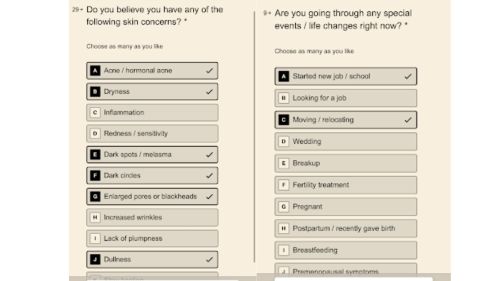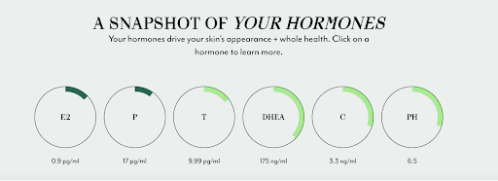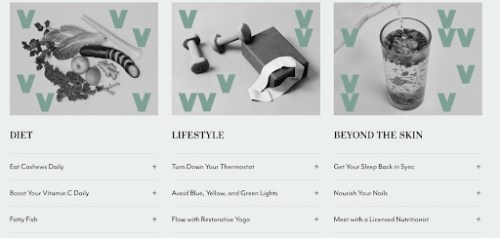Our editors independently select these products. Making a purchase through our links may earn Well+Good a commission
This At-Home Hormone Test Helped Me Biohack My Skin-Care Routine
I tried the Veracity home hormone test to learn about how my hormones impact my skin and how to adjust my routine accordingly.

Hormones and I have a complicated relationship. I’m allowed to say this because I started taking an oral contraceptive in college in an effort to combat my years-long battle with cystic acne. Don’t get me wrong—I’m thankful to have had this solution available to me—but it was also positioned as the only option rather than digging deeper and figuring out what else might be happening beneath the surface.
You, too, may have connected the puzzle pieces, realizing for yourself that you break out at a certain time of the month or when you’re super stressed or anxious. Those instances correlate directly with your hormones. In fact, “hormones are the cause of almost all acne no matter what age you are,” naming progesterone, estrogen, and cortisol as the top players,” says Gary Goldfaden, MD, a Miami-based dermatologist with a namesake skin-care brand.
Knowing that hormones and skin health are closely linked, I was intrigued by the skin-care brand Veracity, which offers tailored regimen recommendations based on an individual’s hormone levels. The name itself means “habitually truthful,” and I appreciated its mission to instill in women an understanding of our bodies. The first step? An at-home hormone test, which started me on my very own biohacking journey.
What is Veracity?
After years of trying to figure out her own skin—specifically, the cause of her dry patches—Allie Egan, Veracity’s CEO and founder, took matters into her own hands. Through a series of doctor’s appointments and in-depth hormone testing, she learned that she had an underactive thyroid. That lengthy experience inspired her to create Veracity, which she calls “a solution that uncovers root causes of issues, big and small, and puts you on a path to better skin and wellness.” The process begins with Veracity’s Skin + Health Test, which I picked up with hopes of better understanding my personal hormone-skin connection.
The test

At the age of 30, as I look to my future and what that means in terms of having kids and simply living a healthier lifestyle, I was compelled to take the test… and as a beauty editor, I’d be lying if I said that I wasn’t doing this partially for vanity reasons, and to understand how my hormones impact my skin. Similarly to ancestry testing, the process involves spitting into a vial, sending it away, and waiting for your results. In addition to sending in the sample, I filled out a form about medications and life events—things like starting a new job or going through a breakup—that could affect my hormones and, in turn, my complexion.
The results

When I received my results by email a few weeks later, I was overwhelmed. I’m no hormone expert, and seeing terms like “low progesterone” and “low estrogen” sounded scary. In addition to progesterone and estrogen, Veracity measures testosterone, DHEA, cortisol, and pH—all of which were on the low side for me.
This Parisian Skincare Brand Is Launching in the United States for the First Time—Here’s What a Derm Wants You to Know

We’re Calling It: Cleansing Balms Are the Face Wash of the Future—Here Are 3 to Add to Your Cart

This Is the One Product That Scarlett Johansson Always Keeps in Her Purse and on Her Bedside Table

A simple answer, but one I didn’t immediately think of, is that my progesterone and estrogen levels were low because I’m currently taking birth control pills. “When women are on the pill, their ovarian hormone levels will be much like those in menopause,” explains Gabrielle Francis, DC, ND, LA, a naturopathic doctor, chiropractor, and acupuncturist who is also Veracity’s functional medicine advisor. However, Kirti Patel, MD, an OBGYN and Chief Medical Officer at POV, notes that the type of testing that Veracity offers is more accurate for those who aren’t taking hormonal contraceptives.
Dr. Francis says that having your own doctor, such as an endocrinologist or a gynecologist, go over these results with you is a smart move. “They can help you determine if there are underlying issues causing the imbalances,” she says. From there, you can make a plan and find the right expert to help you. “Home testing can be a nice first step to open up the conversation surrounding reproductive health and menstrual cycles and what to expect and how our bodies work,” says Lucky Sekhon, MD, a reproductive endocrinologist, infertility specialist, and OBGYN at RMA of New York. But, she stresses that “they cannot be reliably used to diagnose problems.” Instead, Dr. Sekhon says that she would do further blood testing—as opposed to Veracity’s saliva test—to confirm what’s going on and then make a diagnosis from there.
On Veracity’s results page, there’s a tab called “comparison,” which I found helpful because it showed where I fall among other testers regarding their hormone levels and experiences, such as a correlation between low estrogen and acne. I had indicated a few skin concerns on my intake form, including acne, dull skin, dark circles, and hyperpigmentation, and this tab offered insight into how I rank among others with the same hormone-related issues. For instance, 64.8 percent of other testers had low estrogen levels and also experienced acne. With health and other obstacles in general, I find it easy to feel alone in it, but seeing these results made me feel less like I’m the only one going through it.
The recommendations

Based on my results, the Veracity site recommended a routine of products and supplements such as Veracity’s Blemish Calming Cleanser ($42) and Vital PRGST Boost ($65) to balance the skin-related effects of low progesterone and Hydration Balance ($55) to do the same for low estrogen. There were also ingredient recommendations for my skin—sulfur for blemish-busting, mushroom for inflammation, and hyaluronic acid for hydration—which will be helpful to remember when shopping for products from other brands.
In terms of diet, my Veracity report advised me to eat more cashews because of their high zinc levels, which, according to their website, “tells the ovaries to produce progesterone and is an amazing natural anti-acne fighter.” I’ve also started taking a vitamin C supplement, but I liked that the site listed ways to get the nutrient through foods like yellow peppers and cantaloupes.
As for lifestyle, Veracity suggested I work on my sleep and incorporate gentle, restorative yoga. That doesn’t quite jive with my HIIT addiction, but I’m going to try to find more of a balance. I also found it interesting that there was a mention of needing to nourish my nails, because mine are always a wreck. Veracity informed me that “low estrogen levels lead to water loss and nutrient deficiencies, which can cause dehydration and nail ridges,” which was spot on.
What now?
It may sound silly, but having these results makes me feel empowered knowing what’s going on in my body. I’ve stopped taking the birth control pill and am intrigued to see how that will affect my hormone levels. Egan says, “It’s great to make a habit of testing every 3-6 months to see how your body has adjusted and see if you need to alter any of your lifestyle or supplementation practices.”
I’ve already begun incorporating some of Veracity’s recommendations, including taking a probiotic and the aforementioned vitamin C supplement. I also have an appointment with a hormone specialist on the books to dive deeper into my results and get blood work done.
Veracity’s test just scratches the surface of all that’s going on within the body, and I’m eager to learn more about my other hormone levels that the test didn’t include. However, I feel like taking this test was the first step in better understanding my body, and I will continue seeking out additional information about my health, wellness, and skin goals.
Sign Up for Our Daily Newsletter
Get all the latest in wellness, trends, food, fitness, beauty, and more delivered right to your inbox.
Got it, you've been added to our email list.







